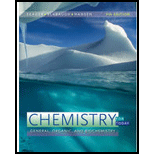
(a)
Interpretation:
The definition of term radioactive is to be stated and the explanation of the given statement is to be stated.
Concept introduction:
The radioactive decay is a process which involves the emission of radiation by an unstable atomic nucleus. The atomic nucleus loses its energy during radioactive decay. The process of radioactive decay is spontaneous.
Answer to Problem 10.1E
An unstable substance which emits high energy radiations by decay of atom is known as radioactive substance. Beta rays itself are not radioactive but they are the product of radioactive decay.
Explanation of Solution
An unstable substance which emits high energy radiations by decay process of atom is known as radioactive substance. Alpha, beta and gamma rays are emitted during radioactive decay of a substance. Beta rays itself are not radioactive but they are the product of radioactive decay.
An unstable substance which emits high energy radiations by decay of atom is known as radioactive substance. Beta rays itself are not radioactive but they are the product of radioactive decay.
(b)
Interpretation:
The explanation of the given statement is to be stated.
Concept introduction:
The radioactive decay is a process which involves the emission of radiation by an unstable atomic nucleus. The atomic nucleus loses it energy during radioactive decay. The process of radioactive decay is spontaneous.
Answer to Problem 10.1E
The given statement is incorrect because Radon is an unstable element and undergoes radioactive decay.
Explanation of Solution
The given statement that radon is a stable radioactive substance is not correct. Radon is an unstable element and undergoes radioactive decay. Radon decays to polonium by emitting alpha and gamma rays.
The given statement is incorrect because radon is an unstable element and undergoes radioactive decay.
Want to see more full solutions like this?
Chapter 10 Solutions
Study Guide with Student Solutions Manual for Seager/Slabaugh/Hansen's Chemistry for Today: General, Organic, and Biochemistry, 9th Edition
- For the condensation reaction between Alamine and histamine, please help me write the amididation reaction mechanism. Then write the three letter code for the product of the reaction, then write the one letter code for the product of the reaction. arrow_forwardHow to draw the reaction mechasnism belowarrow_forwardName the following molecules with IUpacarrow_forward
- What is the molecular orbital for cyclopropenyl anion and is it aromatic, antiaromatic or nonaromatic?arrow_forwardUsing the chart describe the change from cystine to tyrosine and its impact on the protein. Using the chart describe the change from histidine to aspartic acid and its impact on the protein.arrow_forwardHow to get the predicted product of this reaction belowarrow_forward
- Please help me fill out the chart then using the chart describe the change from cystine to tyrosine and its impact on the protein. Then using the chart describe the change from histidine to aspartic acid.arrow_forwardWrite the Esterification reaction mechanism for acetic acid, and one propanol to make propanol ethanoate (molecule that gives peas its odor in flavor)arrow_forwardProvide solutionsarrow_forward
 Chemistry for Engineering StudentsChemistryISBN:9781337398909Author:Lawrence S. Brown, Tom HolmePublisher:Cengage LearningChemistry: Matter and ChangeChemistryISBN:9780078746376Author:Dinah Zike, Laurel Dingrando, Nicholas Hainen, Cheryl WistromPublisher:Glencoe/McGraw-Hill School Pub Co
Chemistry for Engineering StudentsChemistryISBN:9781337398909Author:Lawrence S. Brown, Tom HolmePublisher:Cengage LearningChemistry: Matter and ChangeChemistryISBN:9780078746376Author:Dinah Zike, Laurel Dingrando, Nicholas Hainen, Cheryl WistromPublisher:Glencoe/McGraw-Hill School Pub Co Chemistry for Today: General, Organic, and Bioche...ChemistryISBN:9781305960060Author:Spencer L. Seager, Michael R. Slabaugh, Maren S. HansenPublisher:Cengage Learning
Chemistry for Today: General, Organic, and Bioche...ChemistryISBN:9781305960060Author:Spencer L. Seager, Michael R. Slabaugh, Maren S. HansenPublisher:Cengage Learning Introductory Chemistry: An Active Learning Approa...ChemistryISBN:9781305079250Author:Mark S. Cracolice, Ed PetersPublisher:Cengage Learning
Introductory Chemistry: An Active Learning Approa...ChemistryISBN:9781305079250Author:Mark S. Cracolice, Ed PetersPublisher:Cengage Learning





